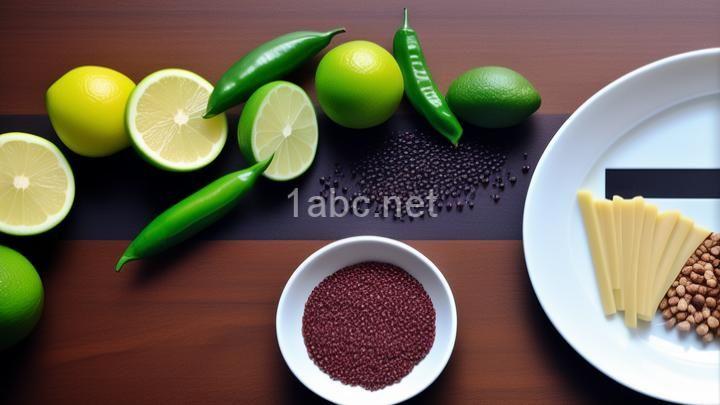Top 10 Foods for Diabetes Prevention

Introduction:
Welcome readers! We are thrilled to have you here and thank you for visiting our blog. Today, we are going to delve into the world of diabetes prevention and explore the top 10 foods that can help in this journey. Diabetes is a prevalent and serious health condition, and prevention is always better than cure. By making simple changes to our diet, we can significantly reduce our risk of developing diabetes. So, let's dive in and discover the incredible power of food in preventing diabetes.
Section 1: Berries
When it comes to diabetes prevention, berries are a true superstar. Not only are they delicious, but they are also packed with antioxidants and fiber that can help regulate blood sugar levels. Berries such as blueberries, strawberries, and raspberries are low in calories and high in nutrients, making them an excellent addition to any diet.
Section 2: Leafy Greens
Leafy greens are not just for rabbits; they are essential for everyone, especially for those looking to prevent diabetes. Spinach, kale, and Swiss chard, among others, are low in calories and high in nutrients like magnesium and vitamin K. Including leafy greens in our diet can help improve insulin sensitivity and reduce the risk of developing diabetes.
Section 3: Whole Grains
When it comes to grains, whole is the way to go. Unlike refined grains, whole grains contain all the essential parts of the grain, including the bran, germ, and endosperm. This means they are rich in fiber, vitamins, and minerals that can help regulate blood sugar levels. Oats, quinoa, and brown rice are fantastic examples of whole grains that can be easily incorporated into our meals.
Section 4: Nuts and Seeds
Nuts and seeds are not only tasty but also incredibly beneficial for diabetes prevention. Packed with healthy fats, protein, and fiber, they can help control blood sugar levels and promote overall heart health. Almonds, walnuts, chia seeds, and flaxseeds are just a few examples of nuts and seeds that can be enjoyed as a snack or added to various dishes.
Section 5: Fish
Incorporating fish into our diet can do wonders for diabetes prevention. Fish, especially fatty fish like salmon, mackerel, and sardines, is an excellent source of omega-3 fatty acids. These healthy fats are known for their ability to reduce inflammation and promote heart health, which can lower the risk of developing diabetes.
Section 6: Legumes
Legumes, including lentils, chickpeas, and black beans, are another powerhouse when it comes to diabetes prevention. These little gems are high in protein and fiber while being low in fat. Including legumes in our diet can help improve blood sugar control and contribute to long-term health.
Section 7: Greek Yogurt
Greek yogurt can be a great addition to a diabetes prevention diet. With its high protein content and gut-friendly probiotics, Greek yogurt can help control blood sugar levels and support overall gut health. When choosing Greek yogurt, it's best to opt for the plain variety to avoid added sugars.
Section 8: Cinnamon
Cinnamon, the aromatic spice we all love, may have some surprising benefits for diabetes prevention. Studies suggest that cinnamon can help improve insulin sensitivity and regulate blood sugar levels. Adding a sprinkle of cinnamon to dishes like oatmeal or smoothies can provide a flavorful twist while potentially offering these health benefits.
Section 9: Garlic
Garlic, known for its distinctive flavor, may also play a role in diabetes prevention. Garlic contains compounds with anti-inflammatory properties and has shown potential positive effects on blood sugar control. Adding garlic to savory dishes not only enhances the taste but may also contribute to our overall health.
Section 10: Dark Chocolate (in moderation)
Last but not least, let's talk about everyone's favorite treat - dark chocolate. Yes, you read that right! Dark chocolate, when consumed in moderation, can actually have surprising benefits for diabetes prevention. Dark chocolate with a high cocoa percentage is rich in antioxidants and may help improve insulin sensitivity. However, it's important to remember that moderation is key due to its calorie content.
Conclusion:
In conclusion, a healthy diet plays a crucial role in diabetes prevention. By incorporating these top 10 foods into our daily meals, we can take significant steps towards reducing our risk of developing diabetes. However, it is essential to remember that these foods should complement an overall balanced diet and a healthy lifestyle. As always, we recommend consulting with healthcare professionals before making any significant changes to your diet.
Thank you for taking the time to read this blog post. We hope you found it informative and inspiring. If you have any questions or thoughts about diabetes prevention or healthy eating habits, please feel free to leave a comment below. Stay tuned for more health-related information and tips on our blog.
FREQUENTLY ASKED QUESTIONS
What is the importance of food in preventing diabetes?
Food plays a crucial role in preventing diabetes. A healthy diet can help maintain blood sugar levels, manage weight, and improve overall health. Here's why food is important in preventing diabetes:
-
Controlling blood sugar: Consuming a balanced diet that includes complex carbohydrates, lean proteins, and healthy fats helps regulate blood sugar levels. Avoiding sugary foods and drinks can prevent spikes in blood sugar, reducing the risk of developing diabetes.
-
Managing weight: Maintaining a healthy weight is essential in preventing diabetes. A nutritious diet rich in fruits, vegetables, whole grains, and lean proteins can help manage weight by providing essential nutrients while keeping calorie intake in check.
-
Promoting insulin sensitivity: Certain foods, such as whole grains, legumes, and leafy greens, can improve insulin sensitivity. Insulin is a hormone responsible for regulating blood sugar levels, and increased sensitivity to insulin can help prevent insulin resistance, a precursor to type 2 diabetes.
-
Providing essential nutrients: A well-balanced diet supplies the body with essential nutrients, including vitamins, minerals, and antioxidants. These nutrients support overall health and can help reduce the risk of developing chronic conditions, including diabetes.
-
Supporting cardiovascular health: Diabetes increases the risk of heart disease and stroke. Choosing heart-healthy foods, such as those low in saturated fats and high in fiber, can help lower cholesterol levels and maintain cardiovascular health.
-
Promoting a healthy lifestyle: Making conscious food choices is a part of an overall healthy lifestyle. Eating nutritious meals, practicing portion control, and incorporating regular physical activity can significantly reduce the risk of developing diabetes.
Remember, it is important to consult with a healthcare professional or a registered dietitian for personalized dietary advice to prevent or manage diabetes effectively.
What are the top 10 foods for diabetes prevention?
When it comes to preventing diabetes, incorporating a balanced and nutritious diet is essential. Here are the top 10 foods that can help in diabetes prevention:
-
Leafy greens: Vegetables like spinach, kale, and Swiss chard are rich in vitamins and minerals, low in carbohydrates, and high in fiber, making them excellent choices for managing blood sugar levels.
-
Berries: Blueberries, strawberries, and raspberries are not only delicious but also packed with antioxidants and fiber. They have a low glycemic index, which means they have a minimal impact on blood sugar levels.
-
Beans and legumes: Beans, lentils, and chickpeas are excellent sources of protein and fiber, making them great choices for stabilizing blood sugar levels and promoting satiety.
-
Whole grains: Opt for whole grains like quinoa, brown rice, and whole wheat bread instead of refined grains. These are rich in fiber and have a lower glycemic index, helping to regulate blood sugar levels.
-
Fatty fish: Salmon, mackerel, and sardines are high in omega-3 fatty acids, which have been shown to reduce the risk of diabetes and improve insulin sensitivity.
-
Greek yogurt: Greek yogurt is an excellent source of protein and probiotics, which promote gut health. Choose plain, unsweetened varieties to avoid added sugars.
-
Nuts: Almonds, walnuts, and pistachios are packed with healthy fats, fiber, and protein, making them nutritious snacks that can help manage blood sugar levels.
-
Garlic: Garlic has been found to have numerous health benefits, including improving insulin sensitivity and reducing inflammation. Add it to your meals for some extra flavor and potential health benefits.
-
Tomatoes: Tomatoes are low in calories and carbohydrates, making them a great addition to a diabetes-friendly diet. They are also rich in vitamins, minerals, and antioxidants.
-
Green tea: Green tea contains compounds that can help regulate blood sugar levels and improve insulin sensitivity. Plus, it's a refreshing and hydrating beverage option.
Remember, a well-rounded diet that includes a variety of nutrient-dense foods is key to diabetes prevention. Along with a healthy diet, regular physical activity and maintaining a healthy weight are also important factors in managing and preventing diabetes.
How do leafy green vegetables help in preventing diabetes?
Leafy green vegetables can play a significant role in preventing diabetes due to their numerous health benefits. These vegetables, such as spinach, kale, and broccoli, are low in calories and high in essential nutrients like vitamins, minerals, and fiber.One key factor in preventing diabetes is maintaining a healthy weight, and leafy greens can support this goal. These vegetables are low in calories, which means you can eat a generous portion without consuming excessive amounts of energy. The fiber content in leafy greens also aids in weight management by keeping you feeling full and satisfied.
Additionally, leafy green vegetables have a low glycemic index, meaning they do not cause a rapid spike in blood sugar levels. This is crucial for preventing diabetes, as high blood sugar levels over time can lead to insulin resistance and eventually type 2 diabetes. By incorporating leafy greens into your diet, you can help regulate blood sugar levels and reduce the risk of developing diabetes.
Moreover, leafy greens contain antioxidants that help protect against cellular damage and inflammation, which are often associated with diabetes. These antioxidants, such as vitamin C and beta-carotene, can neutralize harmful free radicals in the body and promote overall health.
In summary, leafy green vegetables offer a range of benefits that can aid in preventing diabetes. Their low calorie, high fiber, and low glycemic index properties make them an excellent choice for maintaining a healthy weight and regulating blood sugar levels. By including leafy greens in your diet, you can take a proactive approach to reduce the risk of developing diabetes and promote overall well-being.
Why are whole grains recommended for diabetes prevention?
Whole grains are highly recommended for diabetes prevention due to their numerous health benefits. They are packed with essential nutrients like fiber, vitamins, and minerals, which can help regulate blood sugar levels and improve insulin sensitivity.The fiber content in whole grains is particularly beneficial for managing diabetes. It slows down the digestion and absorption of carbohydrates, preventing sudden spikes in blood sugar levels. This can help prevent the onset of type 2 diabetes and also aid in managing blood sugar levels for those already diagnosed with the condition.
Whole grains also have a lower glycemic index compared to refined grains. This means that they are digested and absorbed more slowly, resulting in a gradual rise in blood sugar levels rather than a sudden spike. This can help prevent insulin resistance, a key factor in the development of type 2 diabetes.
Moreover, the vitamins and minerals found in whole grains, such as magnesium and chromium, play a role in glucose metabolism and insulin regulation. These nutrients can enhance the body's ability to utilize insulin effectively and maintain stable blood sugar levels.
Including whole grains in your diet can also contribute to weight management, another important aspect of diabetes prevention. The high fiber content promotes feelings of fullness, reducing the likelihood of overeating and weight gain, which are risk factors for diabetes.
In summary, whole grains offer a multitude of benefits for diabetes prevention. Their fiber content, low glycemic index, and rich nutrient profile make them a valuable addition to a healthy, balanced diet. By incorporating whole grains into your meals, you can support your overall health and reduce the risk of developing diabetes.




